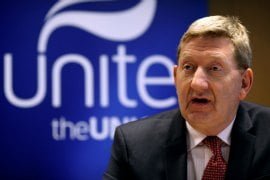Unite General Secretary Len McCluskey has been re-elected, with over 144,000 votes. His only opponent in the election, Jerry Hicks, received nearly 80,000 votes. Luke Wilson comments on McCluskey’s re-election victory and the wider changes that have taken place within Britain’s largest trade union.
Unite General Secretary Len McCluskey has been re-elected, with over 144,000 votes. His only opponent in the election, Jerry Hicks, received nearly 80,000 votes.
In a letter addressed to members, McCluskey posed the need to fight back against the brutal Tory attacks on the working-class:
“We are living in extraordinary times with workers facing unprecedented attacks on their living standards and their rights at work. Thanks to this government of millionaires, work is becoming less secure and austerity threatens the social fabric of our great nation.
“Now more than ever working people need a union which will stand up for them. Unite is that union, a modern progressive union fighting for ordinary people and strengthening your voice at work, in parliament and in our communities… I pledge to focus my energies on the fighting for members and defeating this Tory-led government.”
Since McClusky became General Secretary three years ago, the union has moved sharply to the left. During the days of Simpson and Jackson, strikes were repudiated as a matter of course, and the union and its predecessors cosied up to the New Labour right wing. Now, things could not be more different: not a single strike has been repudiated in the last three years; the Unite leadership has created a £25 million dispute fund; and McCluskey himself has become the most vocal advocate amongst the trade union leaders for the calling of a one-day general strike.
Furthermore, McCluskey has strongly opposed the right-wing of the Labour Party, demanding that the Labour leaders oppose all Tory cuts. He has called on Unite members to join the Labour Party and fight for trade union policies: “to win working people to the Labour Party, and to win the Labour Party to working people”. Unite has promised to support Labour councillors – such as those in Hull – who vote against the cuts, and McCluskey himself has called on all Labour councillors to reject the cuts.
The union itself has been opening up, and its membership is now growing. There has been a drive from McCluskey to bring a whole new generation of young workers into trade union organisation, with greater emphasis placed on the youth structures within Unite. Possibly the most interesting development has been the launch of the Unite Community Membership, aimed at the unemployed and those with precarious employment. This is the first serious attempt to unionise these sections since the 1970s, and Community branches are already beginning to get involved in the struggle against the hated Bedroom Tax.
However, this process of change within Unite is far from complete, as evidenced by the low turnout in the election – of around 15% – and by the fact that Jerry Hicks, McCluskey’s only opponent in the election polled nearly 80,000 votes. Jerry – who also came second in the previous Unite leadership election – ran on a left-wing programme, with an emphasis on the need for greater democracy within the union, calling for: the election of all officials within the union; all officials to be on an average workers’ wage; and “rank-and-file” organisation within each sector. The vote for Jerry – who gained over one third of the vote – shows that these demands for greater democracy within Unite have found an echo with a significant layer of workers who are still dissatisfied with the union and wish to see further change.
The fact is that, whilst the Unite General Secretary and Executive Committee have moved to the left due to the pressure from below, whole middle layers of the union still reflect the past period. There are layers of unelected officials who have been there since Ken Jackson’s time. For high-profile disputes like that of BESNA (the Sparks’ dispute), the General Secretary has intervened directly to support the workers, overruling his own officials on occasion. For less high-profile disputes, this is not possible; hence the need for the election of officials, a demand raised by Jerry, and supported by Socialist Appeal, which doubtless won him much support.
However, Jerry failed to recognise the enormous advances the union has made over the last three years. Furthermore, Jerry’s position on the Labour Party – withholding funding from Labour MPs who do not support the trade unions – is a slippery slope to the call for disaffiliation. In contrast, McCluskey’s demand to take the fight for trade union policies into the Party – committing union to send 5000 activists into the party – shows the way forward in terms of linking the industrial struggle to the political struggle. For this reason, Socialist Appeal generally supported McCluskey’s campaign for re-election, whilst also calling for greater democracy within the union.
We welcome the re-election of Len McCluskey, but now his programme must be put into practice and the demands he has put forward must be turned into a reality. Unite must fight for a clear socialist programme within the Labour Party, reclaiming the Party from the careerists who dominate its leadership, and demanding that all Labour councillors and councils vote against cuts. The new Community branches should be used to reach unemployed youth who have been stripped of a future by capitalism and who are looking for a means to fight back. And the call for a one-day general strike should be carried out in order to galvanise and mobilise the labour movement against austerity. Under capitalism there is no future except unemployment, poverty and misery. We must fight for something better – for a socialist alternative.






